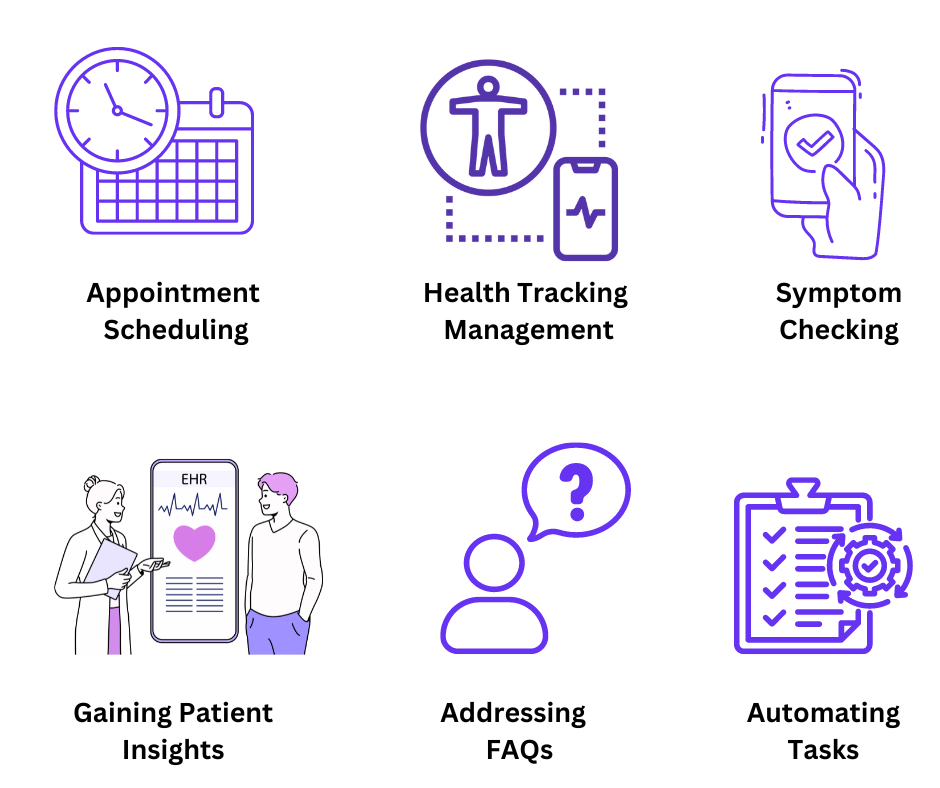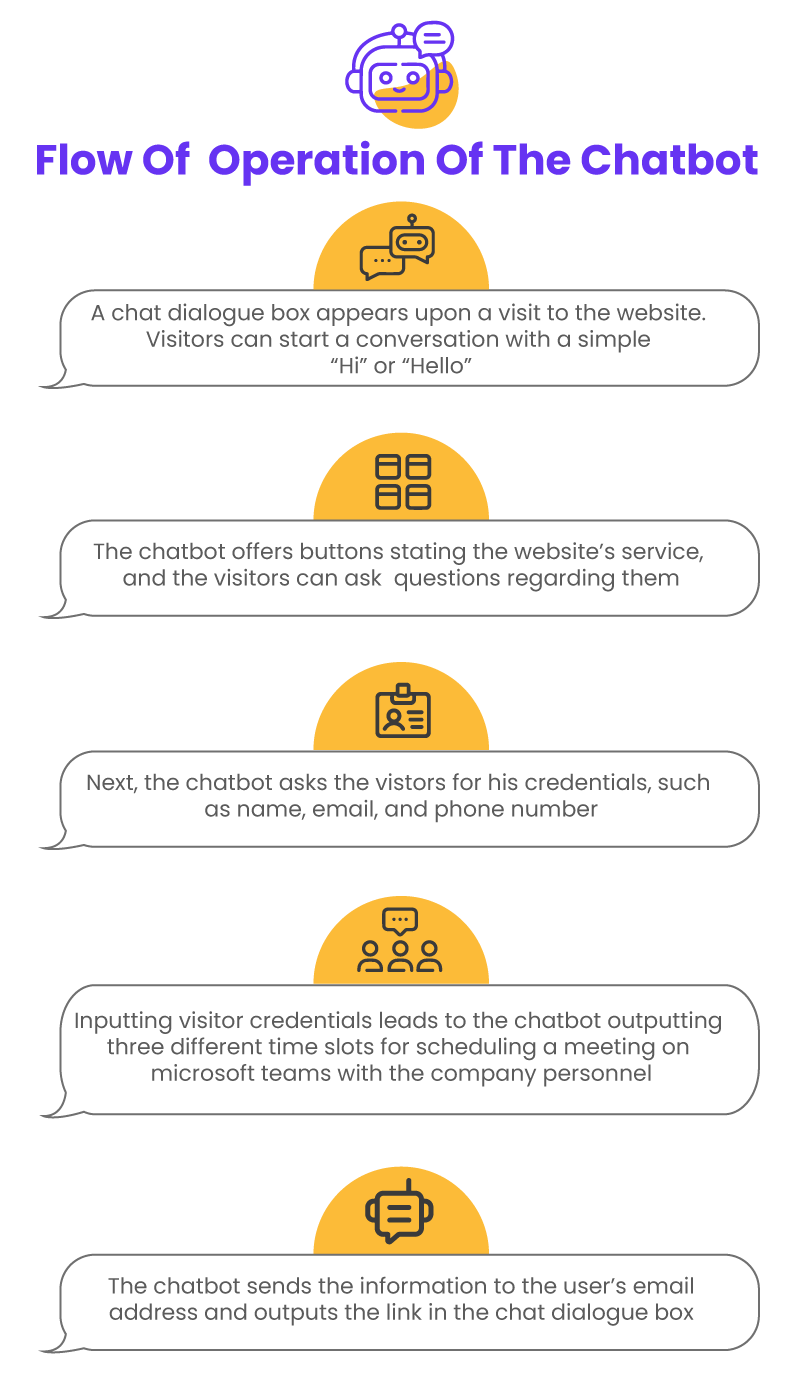Conversational AI in Healthcare: 6 Use Cases
The healthcare ecosystem has undergone a massive transformation in recent years. The need for digital solutions such as distanced consultations, online support and trustworthy health-related data has risen rapidly.
The Covid-19 pandemic has accelerated the acceptance of these digital solutions, particularly in the healthcare sector. This trend is responsible for an increased need for Conversational Artificial Intelligence tools.
Conversational AI for healthcare can make administrative tasks faster and easier, cutting down on the hassle for patients. Using AI-driven systems for scheduling appointments, billing, and filing insurance claims can reduce errors while saving time.

It can serve as a powerful tool in patient engagement, educating people about the facts behind a particular health-related issue.
The perks of integrating Conversational AI into healthcare don’t end there. Artificial Intelligence can lead to more effective and personalized healthcare delivery in the medical field. This ultimately improves the quality of care and patient outcomes.
Another significant benefit of AI adoption in healthcare is its ability to enhance diagnostic accuracy. It has many impacts in various domains. Its potential is extensive in the healthcare sector, where there are numerous unexplored ventures and opportunities waiting to be discovered.
What is Conversational AI in Healthcare?
Conversational AI allows human-like communication between healthcare providers and patients by using chatbots, virtual assistants, or other conversational interfaces. These technologies can understand human inquiries and provide accurate information and support for better health outcomes.
It enables patients to proactively identify their physical health by detecting diseases early and seeking online consultations with healthcare professionals whenever needed.
Furthermore, Conversational AI innovation can assist in remote patient monitoring and telemedicine.
Conversational AI in Healthcare: Use Cases
Conversational AI has the potential to revolutionize patient experience. By providing personalized and engaging interactions, it empowers patients to actively look after their wellness. Virtual assistants and chatbots remind patients of the medicines they must take and ensure that they adhere to the doctor’s instructions. Here are some use cases of Conversational AI in healthcare.
Appointment Scheduling: The task of handling appointments could be strenuous. Although there are several appointment scheduling systems available today, many patients end up calling the healthcare institution instead. This is because these systems are inflexible and unintuitive, making it difficult for patients to interact with them.
Conversational AI is useful as it makes it easier for people to schedule appointments with the help of a chatbot based on the doctor’s availability. It not only helps to book an appointment but also to reschedule or cancel an existing appointment. Moreover, powerful AI platforms can interact with other vital applications and informational systems to update appointments in real-time, avoiding the possibility of inconvenient scheduling conflicts.
Interestingly, it can do more than that. These systems can also help send appointment reminders and other important information like what documents need to be carried out for the appointment or any preparatory steps to follow.
Health Tracking Management: Conversational AI technology helps patients to become more self-reliant in monitoring their physical health. It can help in identifying symptoms early, consulting healthcare experts remotely, and accessing information conveniently through digital platforms.
Patients might also seek tailored counsel, such as precise measures to achieve their goals or medication schedules. Conversational AI can also launch prompts for specific behaviors and give critical reminders, ensuring maintained patient involvement and motivation throughout the journey.
Symptom Checking: Conversational AI can be used to give personalized treatment by checking symptoms. These systems direct the patient through a set of questions and allow them to type in their symptoms for a rapid and accurate diagnosis, after which they can make an appointment with the relevant doctor.
Patients can gain access to health-related information with the help of virtual health assistants. Additionally, it also supplies guidance to patients on managing their health conditions.
Gaining Patient Insights: AI technologies are also meant to transform how healthcare workers operate. Conversational AI tools get access to records and other essential data about patients. This enables care providers to take customized treatment according to patients’ needs.
For example, a doctor is using a Conversational AI tool to get details about their patient’s health condition with the data stored in the system. The doctor can have a summary of the patient’s recent medical history and reported symptoms. This will help the care provider to immediately spot trends and issues, allowing them to adapt treatment solutions to the patient’s concerns. This streamlined method not only saves time, but also ensures that the patient receives personalized care that is tailored to their specific health needs.
Addressing Frequently Asked Questions (FAQs): Clinics and hospitals have implemented a chatbot feature on their website’s homepage to respond to general inquiries. Patients often have questions like “How can I get my medical records?” or “Which doctor is available for a general checkup?”. Using Conversational AI allows patients to acquire the most basic answers without troubling the workflow of the hospital.
Furthermore, in many instances, people find that the websites of their doctors or hospitals are so densely packed with information that it is difficult to locate answers to their questions. Conversational AI or voice assistance can help patients quickly get the information they need. The FAQ section integrated with AI has transformed facilitating users in accessing relevant information rapidly.
Automating Tasks: The integration of AI in healthcare settings can aid in streamlining administrative tasks. Myriad administrative tasks that must be completed in healthcare facilities every day. Although the tasks are completed, they are not necessarily done properly.
Employees, for example, frequently have to move between programs, look for endless forms, or track down several departments just to accomplish their tasks, resulting in wasted time and severe frustration. Employees may make requests, send updates, and track statuses all within the same system and in the form of a natural conversation using an intelligent Conversational AI platform.

Benefits of Conversational AI in Healthcare
The medical industry is facing a severe shortage of healthcare professionals globally. The demand for doctors, nurses and other healthcare workers has increased in recent years.
The World Health Organization (WHO) projects that there will be a shortfall of 10 million health workers, primarily in low- and lower-middle-income countries by 2030.
Multiple opportunities for utilizing conversational AI exist within the healthcare field. If implemented correctly, these applications have the capacity to greatly influence both our personal well-being and overall medical advancements.
One of the biggest advantages of Conversational AI tools like chatbots is that they can provide support to patients round-the-clock. They are accessible anytime, reducing the need for waiting or appointment scheduling.
Furthermore, chatbots have entirely transformed people’s perception of efficient healthcare management systems. They enhance patient engagement by including a user-friendly interface.
Conversational AI utilizes various AI techniques like Natural Language Processing (NLP), Machine Learning (ML), and advanced algorithms to build chatbots. It aims to engage in human-like conversation with patients in an effortless way.

Healthcare chatbots are designed with machine learning algorithms that follow NLP guidelines. NLP, an application of AI, can assist machines in understanding and extracting information from human language in the healthcare domain. Using NLP, chatbots recognize what people say, extract important details, and provide accurate responses.
An effective bot is able to accurately identify and respond appropriately with empathy and emotional intelligence. They can understand and provide reassurance to users according to their varying moods.

Future of AI in Healthcare
The future of AI in healthcare looks promising. The collaboration of technology and healthcare minimizes errors in health reports, improves patient care, and is also beneficial for healthcare providers.
Here are some interesting statistics on incorporating Artificial Intelligence into the medical sector:
- Accenture predicts that AI in healthcare can save the US healthcare economy a whopping $150 billion annually by 2026.
- In a survey of 2,700 patients in the US and other developed nations conducted by TechTarget, 40% of US patients reported that digital health tools were more convenient than in-person healthcare.
- 41% said they received faster responses from their providers over digital platforms.
- 47% of patients said their interaction with their doctors and other providers was more personalized than in the office.
Conclusion
Conversational Artificial Intelligence, with its innovative tools like chatbots and virtual assistants, has the capacity to address numerous challenges across the medical field. From streamlining administrative tasks and appointment scheduling to empowering patients with self-monitoring capabilities and personalized health insights, the potential of this technology is vast and diverse.
